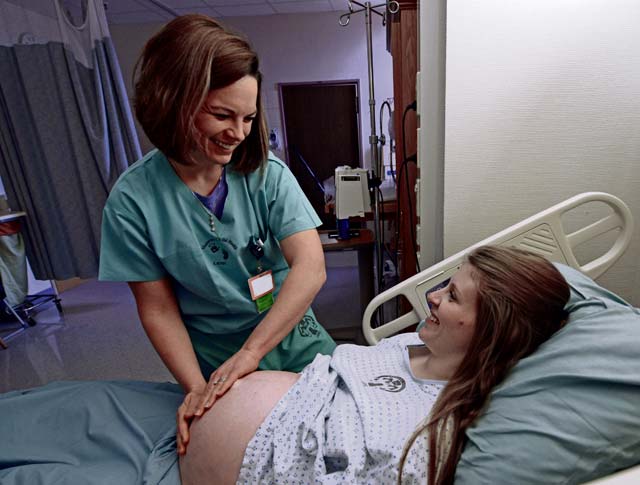
At only 17 years old, Capt. Syrah Nicaisse, Landstuhl Regional Medical Center certified nurse midwife, understood what she was meant to do with her life. As a volunteer at a hospital where her mother worked in the labor and delivery unit, she was always intrigued by the birth process.
“I got to see women in labor, and I was able to see a midwife do a delivery, and that’s when a lightbulb went off,” she said. “I just knew that’s what I needed to do.”
Nicaisse has dedicated her life to promoting healthy relationships between women and their bodies. As a certified nurse midwife, her job is to provide medical care and advice to women during their child-bearing years.
Currently, there are 20 midwives serving in the Air Force. Three, Nicaisse, Capt. Lisa Murchison and Capt. Shenika Zebreski, provide their expertise in women’s health to service members and their families at LRMC.
Service members and their families seek the help of midwives often because they desire to experience a more natural childbirth. Midwives work with physicians to help ensure the healthy delivery of a baby in a way that is most comfortable to the mother.
Though a primary aspect of the work is to support women during pregnancy, delivery and postpartum stages, midwives are also trained to provide advice on general women’s health. Midwives work with patients and physicians to determine healthy options that do not conflict with the personal desires a woman may have in terms of her own health.
“We take care of a woman as a whole,” Nicaisse said. “The main goal is to make her a part of the health care team. We encourage women to educate themselves and empower them to make their own decisions about health care.”
The passion for engaging with her patients on a personal level is one reason Nicaisse was drawn to the field. As an intern for a midwife during college, she witnessed the connections her mentor built with her patients during labor and delivery.
Nicaisse said the creation of these bonds is what makes her job so rewarding.
“Being part of their (medical) team, we really become part of their family,” she said. “We’re there during the most intimate, vulnerable times of their lives, and they invite us in for that. It’s a privilege and an honor.”
Due to the nature of working with service members, midwives on military installations must cope with unique delivery situations. Partners of deployed service members must occasionally deliver their babies without nearby support of the father. In such cases, midwives suggest supplementary support to ensure an easier experience.
Nicaisse encourages families separated due to deployment to have Skype accounts set up, so partners can be present for routine appointments. Small updates, such as the recording of a baby’s heartbeat on a smartphone, for the absent parent can bring the families together despite distance. Nicaisse said appropriate support is an important part of the process of delivery.
“In the military community we tend to be so far removed from our family and friends we grew up with, so we no longer have the support system we would have if we were delivering our baby at home,” Nicaisse said. “We can’t replace those people, but I try to fill in those gaps and make them as comfortable as possible.”
Staff Sgt. Heather Darlow experienced the deliveries of both her children with Nicaisse by her side. Nicaisse came recommended to Darlow when she was pregnant with her first child. Upon meeting her, Darlow said she knew she wanted Nicaisse to deliver her baby.
“Within minutes I was put at ease, and we were soon talking like we had known each other for years,” Darlow said.
The connection between the women lasted beyond Darlow’s first pregnancy, and she approached Nicaisse again when she discovered she was pregnant with her second child. The delivery of her second son proved to be a difficult one, with her baby’s heart rate dropping dangerously low. But Darlow said Nicaisse stayed by her side throughout labor and succeeded in delivering a healthy baby boy.
“I am very fortunate that I was able to have Captain Nicaisse as my midwife,” Darlow said. “She helped me in so many ways while I was pregnant and after. She has forever changed my life.”
Although there is excitement and joy in delivering children, there are also moments of heartbreak.
Pregnancy and delivery are sometimes complicated by medical issues, and small lives may be lost. In such cases, midwives provide emotional support to grieving families.
“That’s the part of my job I don’t like,” Nicaisse said. “I like being there for the families and supporting them, but I wish it wasn’t part of life in general.”
Despite the encompassing difficulties, Nicaisse said being a midwife is a fulfilling work of passion. The desire to care for women and build personal relationships that promote healthy living fuels her and other midwives through the demanding hours and emotional strain.
“Being a midwife is not a job. It’s a calling,” she said. “I am just really happy. I feel like this is where I belong and what I’m supposed to be doing with my life.”


